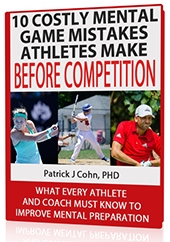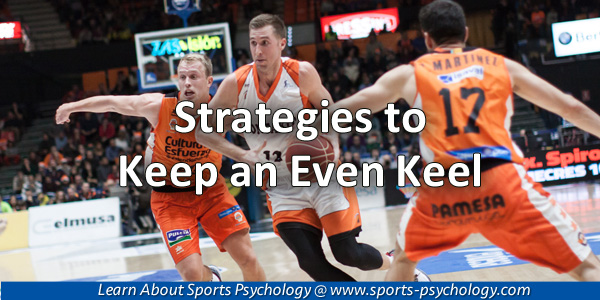How to Keep an Even Keel During Competition
Summary Maintaining an even keel in competition is essential for consistent performance. Emotional highs and lows can derail your game if you let them control your focus. By recognizing triggers, changing reactions to negative events, staying consistent in your approach, keeping a balanced perspective, and mastering your emotions, athletes can navigate the ups and downs of competition effectively.
It is not easy to control your emotions and maintain composure during a competition, although it’s extremely necessary if you are to continue developing your game…
There are many things that can knock you off your game:
- A bad routine for a gymnast
- A slump for a baseball player
- A string of missed shots for a basketball player
- Losing your serve for a tennis player
- A double bogey for a golfer
- A soccer goalie letting in a bad goal
“Even Keel” Refers to Maintaining an Emotional Balance
An even keel is when you don’t get too high when you are doing well and not getting too low when you hit rough patches during the competitive season.
Miami Heat point guard, Tyler Johnson, has dedicated much of his time in the NBA to learning to keep an even keel through the ups and downs of an 82 game season.
Johnson was overlooked by every team in the 2014 NBA draft…
As an undrafted rookie, Johnson played for the Miami Heat in the 2014 NBA Summer League. A few months later, Johnson was waived by the Heat and was chosen to play in the Development League.
In 2015, Johnson signed a 10-day contract but was not retained by the Heat after the contract expired. Two weeks later, Johnson signed a two-year deal with the Heat and has ramped up his efforts ever since to raise his game to the next level.
Johnson has fought through two injuries (a broken jaw and shoulder injury) but, in 2016, Johnson signed a four-year 50 million dollar contract with the Heat.
Johnson knew if he was to take his game to the next level, he would need the ability to maintain an even-keel… And he has!
Each of his three seasons, Johnson has seen his minutes per game increase and he has responded by bettering his points per game each year with a career high average of 13.7 in his third year.
JOHNSON: “I think that’s probably the biggest thing I’ve been needing — the mental aspect of the game. I think physically I have the tools to be a really good player in this league. It’s just mentally staying with it. It’s such a long season. There’s going to be so many ups and downs, but all the great players talk about having that even-keel, not getting too high or too low on themselves. It’s something I’ve been working on.”
Just like Johnson has made the commitment to work on his mental game, you can too.
By taking the first step towards staying composed and emotionally balanced, you can be more productive and consistent throughout the season.
Tips to Keep an Even Keel During Competition:
Your outlook matters more than your in-look. If you are able to keep a positive perspective, you are in better position to play at your peak.
Athletes get in trouble when they turn inward and get tangled up in their intense emotions.
1. Recognize your triggers for negative emotions.
What sets you off? Do you get upset or down after mistakes, bad calls, or rude opponents?
2. Learn to change your reaction to these triggers.
For example, a bad call by an official is just a fact in which you don’t have be upset about. Change your reaction to change your emotion…
Instead of dwelling on “that’s unfair and will hurt my chances of winning,” you might change to: “That’s just one call over a long game. The refs decision is out of my control. Accept it an move on.”
3. To keep momentum on your side, keep your over excitement in check and keep playing the same game that got you into that position.
You should be the master of your emotions rather than your emotions dictating how you perform.
5 Tips to Keep an Even Keel During Competition
1. Recognize Your Emotional Triggers
Identify what situations cause negative emotions—missed shots, bad calls, rude opponents, or mistakes. Awareness is the first step to managing your emotions effectively.
2. Change Your Reaction to Triggers
Instead of letting a bad call or error upset you, reframe it as neutral: “It’s just one call in a long game. Accept it and move on.” Changing your reaction helps maintain composure.
3. Stay Consistent in Your Performance
Don’t let over-excitement or frustration change the way you play. Stick to the techniques, routines, and strategies that got you into the position to succeed.
4. Focus on Perspective, Not Intensity
Keep a positive outlook and avoid turning inward to ruminate on mistakes. Maintaining a balanced perspective helps you stay productive and consistent throughout the competition.
5. Be the Master of Your Emotions
Train yourself to let your emotions support your performance rather than dictate it. Composure under pressure allows you to make better decisions and execute at your peak.
Start by learning how to overcome mistakes with “The Composed Athlete.”
Related Sports Psychology Articles:
- How Athletes Can Balance Sports and Life
- How Parents Can Help Sports Kids Stay Safe
- Top Uses of Sports Psychology for Athletes
Free Mental Toughness Reports

Get instant access to a mental game report to improve your mental toughness. Are you making one or more of these “deadly” mental game mistakes prior to competition? You can improve your mental game with one of our free sports-specific reports below.
with our free mental toughness reports, you’ll:
- Discover if you have positive or negative pregame jitters.
- Identify your pre-competition mental game mistakes.
- Learn the important pregame mental skills to boost your performance and success!
Learn how mental game strategies can boost your mental toughness in sports with Dr. Cohn’s free mental game reports!
FAQ: Maintaining an Emotional Balance for Athletes
Q: What does it mean to keep an even keel in sports?
A: Keeping an even keel means maintaining emotional balance—staying composed during both highs and lows of competition.
Q: How can athletes prevent emotions from affecting performance?
A: By recognizing emotional triggers, reframing negative events, and focusing on consistent routines and strategies.
Q: Why is perspective more important than intensity?
A: A positive outlook helps athletes stay productive and focused, while intense emotional reactions can disrupt performance.
Q: Can emotional balance improve season-long performance?
A: Yes, athletes who maintain composure throughout a season are more consistent, resilient, and able to perform at their peak.
Q: How did Tyler Johnson use this approach in his career?
A: Johnson overcame setbacks as an undrafted player, worked through injuries, and used mental composure to improve his performance and secure a long-term NBA contract.
Dr. Patrick Cohn is an expert mental performance coach who has helped athletes for over 30 years enhance their performance. Dr. Cohn earned a master’s degree in sports psychology from CSUF and a Ph.D. from the University of Virginia, specializing in Applied Sports Psychology.

